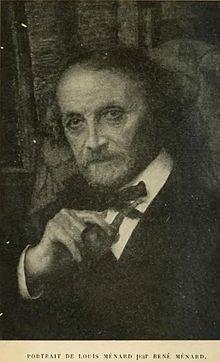- You may be looking for Louis Menand
Louis-Nicolas Ménard (19 October 1822 – 9 February 1901) was a French man of letters also known for his early discoveries on collodion.[1]
He was born in Paris. His versatile genius occupied itself in turn with chemistry, poetry, painting and history. In 1843 he published, under the pseudonym of L. de Senneville, a translation of Prométhée délivré. Turning to chemistry, he discovered collodion in 1846, but its value was not recognized at the time; and its application later to surgery and photography brought him no advantage.
Ménard was a socialist, always in advance of the reform movements of his time. After 1848 he was condemned to imprisonment for his Prologue d'une révolution. He escaped to London, returning to Paris only in 1852. Until 1860 he occupied himself with classical studies, the fruits of which are to be seen in his Poèmes (1855), Polythéisme hellénique (1863), and two academic theses, De sacra poesi graecorum and La Morale avant les philosophes (1860).
The next ten years Menard spent chiefly among the Barbizon artists, and he exhibited several pictures. He was in London at the time of the Paris Commune, and defended it with his pen. In 1887 he became professor at the École des Arts décoratifs, and in 1895 professor of universal history at the Hôtel de Ville in Paris. His Rêveries d'un paien mystique (1876), which contained sonnets, philosophical dialogues and some stories, was followed in 1896 by Poèmes et rêveries d'un paien mystique. Ménard died in Paris on 9 February 1901.
His works include: Histoire des anciens peuples de l'Orient (1882); Histoire des Israélites d'après l'exégèse biblique (1883), and Histoire des Grecs (1884-1886). There is an appreciation of Ménard in the opening chapter of Maurice Barrès's Voyage de Sparte.
References
 This article incorporates text from a publication now in the public domain: Chisholm, Hugh, ed. (1911). "Ménard, Louis Nicolas". Encyclopædia Britannica (11th ed.). Cambridge University Press.
This article incorporates text from a publication now in the public domain: Chisholm, Hugh, ed. (1911). "Ménard, Louis Nicolas". Encyclopædia Britannica (11th ed.). Cambridge University Press.
